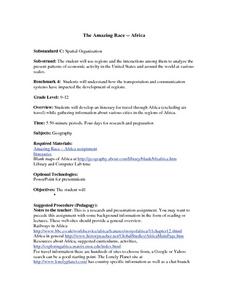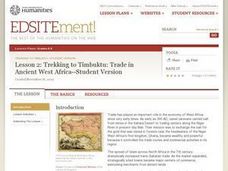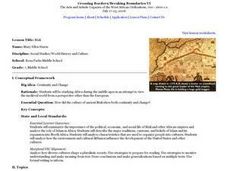National Endowment for the Humanities
David Walker vs. John Day: Two Nineteenth-Century Free Black Men
What was the most beneficial policy for nineteenth-century African Americans: to stay in the United States and work for freedom, or to immigrate to a new place and build a society elsewhere? Your young historians will construct an...
National Endowment for the Humanities
How to Win a World War
High schoolers are have begun to learn the art of diplomacy with each other, but do they understand how diplomacy works at a global level? The second in a series of four lessons, guides scholars in evaluating primary sources....
PBS
African American History: Climbing the Wall
Imagine the challenge of trying to trace your family genealogy if no records were kept of births and deaths. Where would you look for information? What types of documents could provide you with the information you seek? History...
Curated OER
Analyzing Sources on Imperialism
Ninth graders explore the concept of imperialism. For this imperialism lesson, 9th graders analyze primary sources regarding British imperialism in Africa. Students analyze the sources for credibility as they gain an understanding of the...
Mr. Roughton
Pawn Stars: Africa
What element was worth more during the growth of empires in West Africa: gold or halite? After examining various pieces of evidence of primary and secondary source documents placed around the room, your class members will each make a...
Stanford University
Soweto Uprising
What was the impact of the Soweto Uprising? A social studies short answer assessment requires scholars to identify primary sources and explain the impact of the Soweto Uprising. Geared toward high school academics, it targets their...
Curated OER
A Durable Memento: Portraits by Augustus Washington
Students read primary source newspaper articles from mid 19th century United States. The topics of the articles are slavery, abolitionism and colonization. Students are given several options for activities based on the readings.
Curated OER
Africa Colors a Destiny
Students discover the peace corps and the culture of Chad. In this cultural awareness lesson, students watch a slide show and examine various primary sources from peace corps volunteers in Africa. This lesson includes web-links,...
Curated OER
The Amazing Race -- Africa
Students conduct research and gather information regarding various cities in Africa. They discover what it would take to travel to and through Africa and plan a trip through various regions of the continent. They present their itinerary,...
Alabama Department of Archives and History
An African American Represents Alabama during Reconstruction
The era after the Civil War saw a flourishing of African Americans exercising their rights. Using graphic organizers and Internet research, pupils consider the legacy of Benjamin Sterling Turner, who sat in Congress. Afterward, they...
National Endowment for the Humanities
Writing a Diplomatic Toast
Here's to you! Using a role-playing activity and primary source analysis, learners discover the importance of diplomacy. Impersonating a diplomat from a great empire, they write a toast to another empire, analyzing the strengths and...
Curated OER
Trekking to Timbuktu: Trade in West Africa (Lesson 2)
Young scholars examine the importance of trade in West Africa. Using a virtual time capsule, they travel back to ancient times and travel along with a caravan. They answer specific questions related to the journey and items they are...
National Endowment for the Humanities
Analyzing “Intercepted Intelligence”
A good diplomat needs to know how world events can affect their country. First, class members examine the Papal Bull that excommunicated Queen Elizabeth I from the Roman Catholic Church. Then, learners playing the role of diplomat from...
Curated OER
Mali
Seventh graders begin the lesson plan by reading primary sources about the country of Mali. Using maps drawn in the past, they discuss what they can gather about the country from the map and how it has changed over time. They use a...
Boston University
South African Short Stories: Apartheid, Civil Rights, and You
How are short stories from South Africa connected to issues of civil rights in the United States? A unit plan uses South African short stories to discuss issues such as apartheid, colonization, and civil rights. Questions and activities...
Roy Rosenzweig Center for History and New Media
Slaves and Indentured Servants
In theory, at least, indentured servitude and slavery were two different practices in the American colonies. Class groups conduct a close reading of two primary source documents, one written by a slave and one by an indentured servant,...
Roy Rosenzweig Center for History and New Media
European Explorers
To compare how the Spanish, French, and English approached the exploration of North America, class groups examine primary source documents and become experts on one of four explorers: Francisco Coronado, Robert LaSalle, Samuel de...
Digital History
The Slave Trade
When studying the slave trade in early American and world history, use this document to expose your learners to the abhorrent conditions that existed on slave ships. Read through two first-person accounts of the enslavement process,...
Student Handouts
Letter from Birmingham Jail
Analyze an abridged version of Martin Luther King Jr's "Letter from Birmingham Jail." Class members read the excerpt and respond to four provided questions, which focus on the content provided. Consider taking the time to read the entire...
Los Angeles Unified School District
World History Medieval and Early Modern Times
A slew of graphic organizers, worksheets, and student activities are packaged here for your world history pupils. From comparing and contrasting the Qur'an and Sunnah, studying cultural diffusion across eastern nations, or examining...
Annenberg Foundation
Pre-Columbian America
What was life like in America before Christopher Columbus discovered the New World? Scholars investigate life in the Americas through the eyes of Native Americans in the first lesson of a 22-part series covering America's history. Using...
PBS
Arthur’s World Neighborhood: Bibliography for Kids
Support young learners as they expand their cultural awareness with this list of children's literature on countries from around the globe. Including both fictional and non-fictional texts. This resource will help...
Curated OER
Drake’s West Indian Voyage 1588-1589
Learners examine the exploration routes of Sir Francis Drake. In this American exploration lesson, students investigate primary sources to trace the routes and contact with the natives that Sir Francis Drake experienced on his voyages in...
Curated OER
Pluralism
Students analyze advantages and disadvantages of living in a plurlistic society. They work in groups, to identify the various groups (blacks, whites, Asians, and Coloureds) in the era of apartheid in South Africa by using primary and...

























